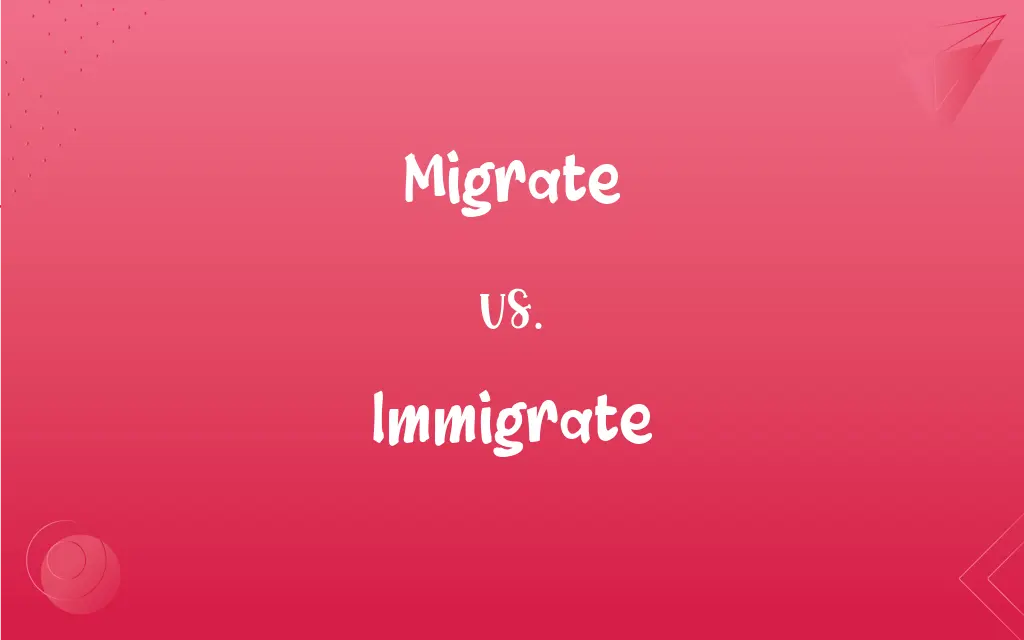Migrate vs. Immigrate: What's the Difference?
Edited by Aimie Carlson || By Janet White || Published on November 15, 2023
Migrate means to move from one place to another, often seasonally or periodically. Immigrate means to move into a country with the intent to live there permanently.

Key Differences
Migrate and immigrate are both related to movement, but they differ in perspective and context. Migrate generally refers to the act of moving from one location to another. This movement can be within the borders of a single country or across international boundaries. Animals, as well as humans, can migrate, often driven by factors like changes in the environment, employment opportunities, or even climate.
Immigrate, on the other hand, specifically involves moving into a country or region with the intention of settling there. When one immigrates, it often implies a long-term or permanent shift, usually for reasons such as better economic prospects, political asylum, or family reunification. The word immigrate always involves crossing international borders and carries a sense of permanence.
When discussing migrate, the focus is often on the act of movement itself. For instance, birds might migrate south for the winter, or a person might migrate to another state for work. The primary essence of the term revolves around relocation, be it temporary or permanent.
Conversely, when one uses the term immigrate, the emphasis is on the destination and the act of entering a new country to reside. Someone might immigrate to the United States from Mexico or to Canada from India. Immigrate brings along notions of adaptation, cultural assimilation, and establishing roots in a new land.
Comparison Chart
Perspective
Movement between places
Moving into a place
ADVERTISEMENT
Duration
Can be temporary or permanent
Generally implies permanence
Subjects
Applies to animals and humans
Applies primarily to humans
Borders
Can be within or across borders
Always involves crossing international borders
Focus
On the act of movement itself
On the destination and intent to reside there
Migrate and Immigrate Definitions
Migrate
To move within a country or territory.
Families might migrate westward in search of land.
ADVERTISEMENT
Immigrate
To move to a new country, leaving one's homeland.
Several families immigrated due to political unrest.
Migrate
To move from one region to another, often seasonally.
Many birds migrate south during the winter.
Immigrate
To come into a country as a foreigner for permanent residence.
Many scientists immigrate for better research opportunities.
Migrate
To relocate, especially in search of better conditions or opportunities.
Young adults often migrate to urban areas for jobs.
Immigrate
To enter and settle in a new country or region.
Her grandparents immigrated to the U.S. in the 1920s.
Migrate
To shift from one habitat or environment to another.
Whales migrate to warmer waters to give birth.
Immigrate
To relocate internationally with the intention of settling.
They decided to immigrate to Canada for its welcoming policies.
Migrate
To change position or location over time.
Over centuries, communities can migrate due to changing landscapes.
Immigrate
To transition from one nationality to another through relocation.
After they immigrated, they embraced the culture of their new home.
Migrate
To move from one country or region and settle in another.
Immigrate
To enter and settle in a country or region to which one is not native. See Usage Note at migrate.
Migrate
To change location periodically, especially by moving seasonally from one region to another.
Immigrate
To send or introduce as immigrants
Britain immigrated many colonists to the New World.
Migrate
(Computers) To be moved from one system to another
Migrated to an updated version of the platform.
Immigrate
(intransitive) To move into a foreign country to stay permanently.
Migrate
To move (something) from one system to another
Migrated specific applications to a selected server.
Immigrate
To come into a country of which one is not a native, for the purpose of permanent residence. See Emigrate.
Migrate
(intransitive) To relocate periodically from one region to another, usually according to the seasons.
Twice a year the geese migrate — from Florida to Canada and back again.
Twice a year the Minnesotans migrate from their state to the Gulf of Mexico.
Immigrate
Migrate to a new environment;
Only few plants can immigrate to the island
Migrate
(intransitive) To change one's geographic pattern of habitation.
Many groups had migrated to western Europe from the plains of eastern Europe.
Immigrate
Introduce or send as immigrants;
Britain immigrated many colonists to America
Migrate
(intransitive) To change habitations across a border; to move from one country or political region to another.
To escape persecution, they migrated to a neutral country.
Immigrate
Come into a new country and change residency;
Many people immigrated at the beginning of the 20th century
Migrate
(intransitive) To move slowly towards, usually in groups.
Once the hosts started bickering in the kitchens, the guests began to migrate towards the living room.
Migrate
: To move computer code or files from one computer or network to another.
They had finished migrating all of the affected code to the production server by 2:00am, three hours later than expected.
Migrate
To induce customers to shift purchases from one set of a company's related products to another.
We were hoping to migrate the customers of the "C" series to the "E" series and the "E" customers to the "S" series.
Migrate
To remove from one country or region to another, with a view to residence; to change one's place of residence; to remove; as, the Moors who migrated from Africa into Spain; to migrate to the West.
Migrate
To pass periodically from one region or climate to another for feeding or breeding; - said of certain birds, fishes, and quadrupeds.
Migrate
Move from one country or region to another and settle there;
Many Germans migrated to South America in the mid-19th century
This tribe transmigrated many times over the centuries
Migrate
Move periodically or seasonally;
Birds migrate in the Winter
The worker migrate to where the crops need harvesting
FAQs
What documentation is usually needed to immigrate?
Typically, passports, visas, and other legal documents are required to immigrate.
Can both humans and animals migrate?
Yes, both humans and animals can migrate for various reasons.
Is migrating always due to negative reasons?
No, people might migrate for positive reasons like education or job opportunities.
Is immigrating always a choice?
Not always. Some people immigrate due to external factors like war or persecution.
Can migrating be temporary?
Yes, people or animals might migrate seasonally or for short durations.
What challenges do immigrants often face?
Immigrants might face cultural, language, economic, or legal challenges in their new homeland.
Is migration always voluntary?
No, factors like natural disasters can force populations to migrate.
What is the difference between an immigrant and a refugee?
Refugees are forced to flee their homeland due to threats, while immigrants might move for various reasons, often by choice.
Can climate change influence migration?
Yes, changing environmental conditions can cause both humans and animals to migrate.
What's the difference between immigration and naturalization?
Immigration is the act of moving to a new country, while naturalization is the process of becoming a citizen of that country.
Can someone immigrate to any country they wish?
No, immigration is subject to the laws and policies of the destination country.
Is immigrating a recent phenomenon?
No, humans have been immigrating for various reasons for millennia.
Why might people choose not to migrate even under harsh conditions?
Factors like attachment to homeland, lack of resources, or fear can deter migration.
Can immigrating be a lengthy process?
Yes, depending on the country and circumstances, immigrating can be complex and time-consuming.
Why do animals migrate?
Animals often migrate in search of food, better climates, or breeding grounds.
Can technology influence migration patterns?
Yes, advances in transportation and communication have changed human migration patterns.
Can someone be both an emigrant and an immigrant?
Yes, they're an emigrant from their home country and an immigrant in their new country.
Are immigrants always foreign nationals?
Typically, yes, but after gaining citizenship, they may no longer be considered foreign nationals.
Do all animals migrate?
No, not all animals migrate; it depends on the species and environmental factors.
Is migration a modern concept?
No, migration has been a part of human and animal behavior for ages.
About Author
Written by
Janet WhiteJanet White has been an esteemed writer and blogger for Difference Wiki. Holding a Master's degree in Science and Medical Journalism from the prestigious Boston University, she has consistently demonstrated her expertise and passion for her field. When she's not immersed in her work, Janet relishes her time exercising, delving into a good book, and cherishing moments with friends and family.
Edited by
Aimie CarlsonAimie Carlson, holding a master's degree in English literature, is a fervent English language enthusiast. She lends her writing talents to Difference Wiki, a prominent website that specializes in comparisons, offering readers insightful analyses that both captivate and inform.






































































